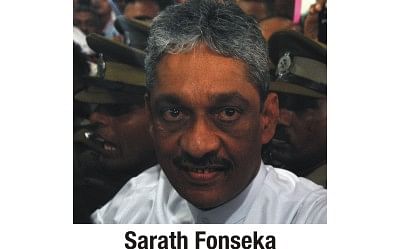Sri Lanka must face war probe: Ex army chief

Sri Lanka must co-operate with any international investigation into alleged war crimes, ex-army chief Sarath Fonseka told the BBC yesterday, a day after his release from jail.
He said some Sri Lankan leaders were "hiding their faces" over the conduct of the war, as if they were guilty.
But Fonseka, who led the army to its 2009 victory over Tamil rebels, denied thousands of civilians had been killed.
"The large figures of 30,000, 40,000, [who are said to have] died - it was not practicable. The way we conducted the war, the type of weapons systems we used, the manuals we made, we were always concerned about the security of the civilians," Fonseka said.
There have been repeated calls for an international probe into the war.
Human rights groups estimate that up to 40,000 civilians were killed in the final months of the war. The government recently released its own estimate, concluding that about 9,000 people perished during that period
In a BBC interview, his first on a one-to-one basis since being freed on Monday, Fonseka said that the attitude of some Sri Lankan leaders gave the world the impression that they were guilty of something.
He added that he is "ready to answer for any allegations about the war crimes in relation to the military operations".
But he agreed that the focus on human rights violations and reconciliation urged by the UN was important.
Fonseka also said that he - and not the country's political leaders - was in charge of the military at the end of the war and that he would "not be scared" to answer questions about that period.
He said that he believed civilians were given weapons and put on the front line by rebels and as a result the army would not have been able to tell them apart.
Sri Lanka's army put an end to 26 years of brutal civil war when they defeated the separatist Tamil Tigers in May 2009.

 For all latest news, follow The Daily Star's Google News channel.
For all latest news, follow The Daily Star's Google News channel. 



Comments